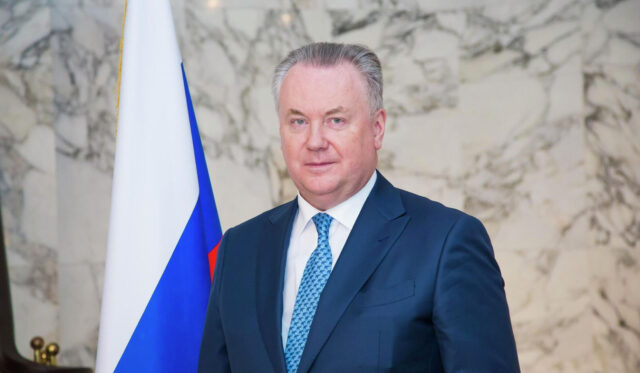
Russia Playing Cat-and-Mouse With OSCE (Part One)
Publication: Eurasia Daily Monitor Volume: 20 Issue: 182
By:

The Organization for Security and Co-operation in Europe (OSCE) is holding its annual meeting at the level of foreign ministers from November 30 to December 1 in North Macedonia, the organization’s chair for 2023. Several Western governments—including those in Washington, Berlin, and Paris—are coming to the meeting with two main purposes in mind. First, they aim to take the initial steps to end Russia’s isolation within the OSCE by inviting Russian Foreign Minister Sergei Lavrov to attend, albeit without holding official meetings with him and still condemning Russia’s invasion of Ukraine. Second, Western leaders may satisfy certain Russian demands regarding the OSCE’s internal workings, fearing that Russia could otherwise “destroy” the organization by either vetoing everything or simply abandoning it.
Russia, however, does not intend to kill the OSCE as feared. On the contrary, Moscow is vested in keeping the OSCE alive as it has heretofore done: on the tight leash of the Kremlin’s veto power and deferring to Russian interests in Eastern Europe. It is on that leash and at this price that the OSCE has survived for the past two decades (see EDM, December 12, 2019).
Moscow’s invasion of Ukraine in 2022 shocked most of the OSCE’s 57 participating states into isolating Russia. In retaliation, Moscow used its veto or blocking powers to paralyze the OSCE through the following actions:
- Blocked the election of the OSCE’s chairing country for 2024;
- Refused the routine prolongation of mandates of the highest OSCE officials (the secretary-general and the heads of autonomous institutions concerned with national minorities, media freedom, and election observation);
- Blocked the adoption of the OSCE’s annual budgets for 2002 and 2003, reducing the organization to survival through handouts;
- Demanded that Lavrov be invited to this year’s meeting as a precondition for negotiating some of these issues.
These moves apparently intimidated the most influential Western governments into voicing openness to negotiating compromises with Russia to save the OSCE (Security and Human Rights Monitor, July 4, November 6).
Estonia was the only candidate country for OSCE chair in 2024. Tallinn had launched its candidacy at least three years in advance (a customary practice) and had been endorsed by the European Union’s caucus in the OSCE (27 EU member states and most partner countries). Russia had objected to Estonia on the grounds of it being an “anti-Russia” country. Moscow recently changed that line to declare Estonia ineligible due to its North Atlantic Treaty Organization (NATO) membership. Russia would only accept a neutral or nonaligned country as chair in 2024.
Moscow has further asserted this position in recent months. Russia’s permanent representative to the OSCE, Aleksandr Lukashevich, warned the organization’s Permanent Council: “We are ready to consider alternative candidacies, but not from NATO. All members of this bloc waging a proxy war against Russia only reflect the interests of their North American hegemon. The OSCE will not survive another year with another NATO country at the helm” (Twitter.com/RF_OSCE, September 26). Undeterred, a meeting of the foreign ministers from EU member states in Brussels on November 13 reconfirmed unanimous support for Estonia’s candidacy (ERR.ee, November 13).
On November 20, however, a diplomatic note from the US mission to the OSCE, addressed to all EU members, was leaked. The statement reads, “The U.S. appreciates Estonia’s willingness to serve as 2024 chair, [but] Russia has made clear that it will not join the consensus on another NATO member as chair. … The OSCE urgently needs to identify a country capable of gaining consensus to serve as chair in 2024. A failure to do so is a victory for Russia” (Radio Free Europe/Radio Liberty, November 20). For its part, the European Union never asked Estonia to drop its candidacy.
Estonia did not withdraw its candidacy after the United States asked it to do so. According to Foreign Minister Margus Tsakhna, Estonia “continues to hold the position that concessions to the aggressor must be ruled out,” including when “the aggressor violates all of the OSCE’s fundamental norms” (ERR.ee, November 21; EurActiv, November 27).
With Washington’s support, the North Macedonian chairmanship scrambled to enlist the neutral state of Malta as a candidate for the 2024 chairmanship. Russia blocked Malta’s candidacy along with the appointments of the four top OSCE officials (see above). Russia argued that Lavrov must be allowed to attend the year-end ministerial meeting in North Macedonia to be directly involved in these decisions (Radio Free Europe/Radio Liberty, November 23). With the clock ticking, this demand was conceded as well. On November 27, the OSCE’s Permanent Council approved Malta to chair the organization for 2024.
The net result is a diplomatic success for Russia. At the tactical level, Moscow managed to fracture Western unity within the OSCE. Conceding to Russia that a NATO country is ineligible to hold a certain international post seems unprecedented and, potentially, precedent-setting. Washington asked Tallinn to stand down, notwithstanding that Estonia was the European Union’s candidate to chair the OSCE. The last-minute scramble to replace Estonia with another candidate to “save the OSCE” unwittingly suggests that the organization is in crisis because of Tallinn. In reality, the crisis is Russian-made, and this could have been clearly stated in an effort to force Moscow to back down.



